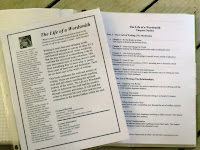For those
who’ve known me for any length of time are aware that organization isn’t
my strong suit—at least not in the conventional meaning. My desk is
covered in stacks of paper and the walls of my office are papered with
rainbow hued sticky notes. It’s a system that works for me—but I quickly
discovered it didn’t translate when I went on the road.
So I found another way to keep myself on track when I’m away from the office and my conference notebook was born.
It’s really
pretty funny. The moment people see my notebook they immediately assume
I’m this ultra-organized whiz. Actually, the opposite is true and my
notebook is just a last ditch effort at self-preservation. Another thing
I’ve noticed is that this notebook works well no matter what your
natural bent toward organization.
The primary
idea for this notebook is that it contains everything I need at a
writers conference so I don’t have to dig through bags or be constantly
returning to my room for something I’ve forgotten.
So let’s get to it!
First,
I choose a one and a half inch three ring binder. Mine is green because
green is my favorite color. I make sure there’s a sleeve on the front
cover to slide a cover into because it hold my contact information if I
should lay it down and leave it somewhere.
Next,
in the front I have a small zippered pouch with a couple of pens and
some paper clips. I can also slide in a small lipstick, some band-aids
and tissues.
After that, I have a neat insert that holds several different size and colors of sticky notes.
Then,
I add 4 pages of clear business card holders. I use the kind that are
the size of a full page, so I have plenty of room to add business cards.
I keep the first three empty and use them to store business cards I get
from others. The last page is full of my personal business cards, so I
always have plenty to hand out. (Don’t know what to include on a
business card? I posted a blog on that here.)
The next part is divided into sections with tabs. Each project I’m pitching has a section. Here’s what would go into a section.
- A clear plastic sleeve containing my one sheet for that project. (Don’t know what a one sheet is? Click here for a post on one sheets).
- An outline for the project—if it’s non-fiction.
- A synopsis for the project—if it’s fiction.
- A sample of my writing for the project. This can either be a couple of sample devotions (for a devotional book) or the first couple of chapters in a book (fiction or non-fiction).

I have
several copies of my one sheet, outline, synopsis and sample—just in
case the person I’m showing it to wants to keep it or mark it up with
suggestions.
Finally, after the section for projects I stock the back of the notebook with notebook paper and extra clear plastic sleeves and tabs.
Extras, you can include in your notebook might be a bio
sheet, a list of topics if you're a speaker or even a list of articles
you might want to pitch. The nice thing about this kind of notebook is
you can personalize it to fit your needs.
With this
notebook, no matter where I run into an editor or agent, I’m always
prepared. I literally have everything at my fingertips. During a
conference I NEVER go anywhere without my notebook.
So what have you found to help keep you on track while at a conference? We’d love to learn from your experiences too.
Blessings,
Edie
Edie Melson is the author of numerous books, as well as a freelance writer and editor. Her blog, The Write Conversation, reaches thousands each month. She’s the co-director of the Blue Ridge Mountains ChristianWriters Conference and the Social Media Mentor at My Book Therapy. She’s also the Military Family Blogger at Guideposts. Com, Social Media Director for SouthernWriters Magazine and the Senior Editor for NovelRocket.com. Connect with her on Twitter and Facebook. Don't miss her new book from Worthy Inspired, WHILE MY SOLDIER SERVES.





